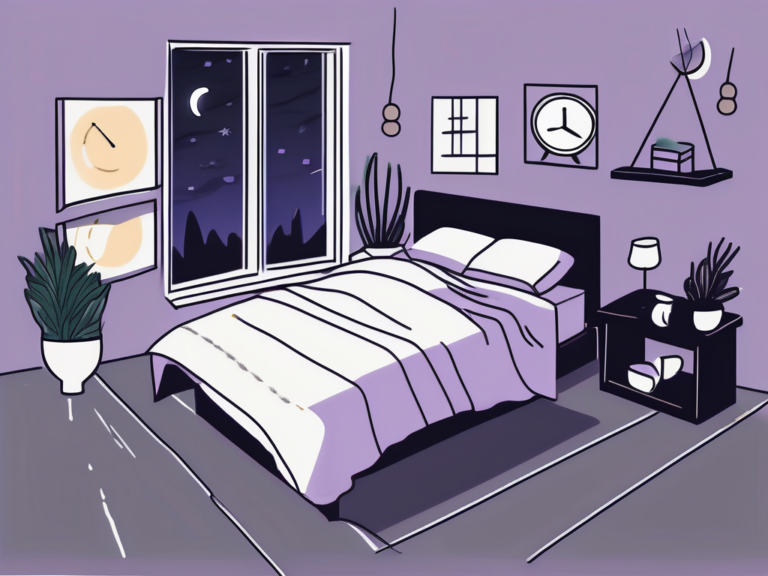Tips on How to Stop a Racing Mind for Sleep
Do you find yourself lying in bed, unable to sleep because your mind is racing with thoughts and worries? If so, you’re not alone. Many people struggle with a racing mind, which can greatly impact the quality of their sleep. In this article, we will explore the causes of a racing mind and provide you with effective techniques to calm your thoughts and improve your sleep. Additionally, we will discuss the role of diet and exercise in sleep quality, as well as how to create a sleep-friendly environment. Lastly, we will touch on seeking professional help for sleep disorders. So, let’s dive in!
Understanding the Causes of a Racing Mind
One of the primary factors that contributes to a racing mind is stress and anxiety. The demands of our daily lives, such as work deadlines, financial concerns, and relationship issues, can weigh heavily on our minds and make it difficult to unwind at night. Additionally, lifestyle choices, such as excessive caffeine consumption or using electronic devices before bed, can also stimulate the mind and interfere with sleep.
The Impact of Stress and Anxiety on Sleep
Stress and anxiety can wreak havoc on our sleep patterns. When we are feeling stressed or anxious, our bodies produce cortisol, a hormone that increases alertness. This can make it challenging to relax and fall asleep. Furthermore, racing thoughts and worries can keep our minds engaged, making it difficult to quiet our thoughts and drift off to sleep.
The Role of Lifestyle Choices in Sleep Quality
Our lifestyle choices play a significant role in the quality of our sleep. For instance, drinking caffeine too close to bedtime can interfere with our ability to fall asleep. Similarly, using electronic devices, such as smartphones or tablets, emitting blue light can disrupt our natural sleep-wake cycle. It’s important to be mindful of these choices and make adjustments to promote better sleep.
Another factor that can contribute to a racing mind is an overactive imagination. Some individuals have a naturally creative and imaginative mind, which can lead to a constant stream of thoughts and ideas. While this can be a wonderful asset during the day, it can become a challenge when trying to quiet the mind for sleep. The imagination can run wild, conjuring up scenarios, stories, and possibilities, making it difficult to relax and let go.
In addition to stress and imagination, another cause of a racing mind can be unresolved emotions. When we have unresolved emotions, such as anger, sadness, or fear, they can manifest as racing thoughts and restlessness. These emotions may be related to past experiences or current situations that we haven’t fully processed or addressed. It’s important to acknowledge and work through these emotions to find inner peace and calm the racing mind.
Techniques to Calm a Racing Mind
Breathing Exercises for Sleep
Deep breathing exercises can help calm a racing mind and induce relaxation. One effective technique is the 4-7-8 breathing method. To do this, inhale quietly through your nose to a mental count of four, hold your breath for a count of seven, and exhale completely through your mouth to a count of eight. Repeat this pattern several times until you feel more at ease.
The Power of Visualization for Sleep
Visualization involves creating mental images of peaceful and serene scenes or situations. By focusing on these positive visuals, you can divert your attention away from racing thoughts and create a sense of calm. Imagine yourself in a tranquil setting, such as a beach or a quiet forest, and visualize the details of the environment, such as the sound of waves or the smell of fresh air.
Another powerful visualization technique is to imagine yourself floating on a cloud, weightless and free from any worries or stress. As you float, you can feel the gentle breeze against your skin, carrying away any tension or anxiety. The cloud takes you on a journey through the sky, passing by fluffy white clouds and vibrant rainbows, filling you with a sense of peace and tranquility.
Additionally, you can visualize yourself in a cozy cabin nestled in the mountains. Picture the crackling fireplace, casting a warm glow on the wooden walls, and feel the softness of the plush armchair as you sink into it. Outside the window, snowflakes gently fall, creating a serene winter wonderland. As you immerse yourself in this visualization, you can feel your racing mind gradually slowing down, replaced by a deep sense of calm and relaxation.
The Role of Diet and Exercise in Sleep Quality
Foods that Promote Sleep
The food we consume can have a significant impact on our sleep quality. Some foods, such as almonds, walnuts, and kiwi, are rich in nutrients that promote better sleep. Almonds are a great source of magnesium, which has been shown to improve sleep quality by regulating the body’s production of melatonin, a hormone that helps regulate sleep. Walnuts, on the other hand, are packed with omega-3 fatty acids, which can help reduce inflammation and promote better sleep. And let’s not forget about kiwi, which is not only delicious but also contains high levels of serotonin, a neurotransmitter that helps regulate sleep and mood.
In addition to these sleep-promoting foods, there are also certain foods that contain tryptophan, an amino acid that aids in the production of serotonin. Turkey, for example, is well-known for its high tryptophan content. When consumed, tryptophan is converted into serotonin, which helps regulate sleep. Warm milk is another popular choice for promoting sleep, as it contains both tryptophan and calcium. Calcium is important for the production of melatonin, which helps regulate the sleep-wake cycle. So, a warm glass of milk before bed can not only help you feel cozy but also improve your sleep quality.
It’s also worth mentioning that avoiding heavy meals and stimulants like caffeine before bed can significantly improve sleep quality. Heavy meals can cause discomfort and indigestion, making it harder to fall asleep and stay asleep throughout the night. Caffeine, on the other hand, is a stimulant that can interfere with the sleep-wake cycle. It’s best to avoid consuming caffeine at least 4-6 hours before bedtime to ensure it doesn’t disrupt your sleep.
The Impact of Physical Activity on Sleep
Regular physical activity has been shown to improve sleep quality. Engaging in exercises such as walking, jogging, or yoga can help reduce stress and increase relaxation. When we exercise, our body releases endorphins, which are known as “feel-good” hormones. These endorphins not only boost our mood but also help regulate our sleep patterns. By incorporating physical activity into our daily routine, we can promote better sleep and overall well-being.
However, it’s important to time your exercise routine appropriately, as exercising too close to bedtime can have the opposite effect and make it harder to fall asleep. When we exercise, our body temperature rises, and it can take a few hours for it to cool down. This rise and fall in body temperature can affect our sleep. It’s recommended to finish your workout at least a few hours before bedtime to allow your body to cool down and prepare for sleep. This way, you can reap the benefits of exercise without sacrificing your sleep quality.
In conclusion, both diet and exercise play crucial roles in promoting better sleep quality. By incorporating sleep-promoting foods into our diet and engaging in regular physical activity, we can create a sleep-friendly environment for our bodies. So, next time you’re planning your meals or workout routine, remember to prioritize your sleep and make choices that support a restful night’s sleep.
Creating a Sleep-Friendly Environment
The Importance of a Sleep Routine
Establishing a consistent sleep routine can signal to your body that it’s time to wind down and prepare for sleep. This is because our bodies have a natural internal clock, known as the circadian rhythm, which regulates our sleep-wake cycle. By going to bed and waking up at the same time each day, you help synchronize this internal clock, making it easier for you to fall asleep and wake up feeling refreshed.
In addition to maintaining a regular sleep schedule, engaging in relaxing activities before bed can further enhance your sleep routine. For example, reading a book can help calm your mind and distract you from any stress or worries that may be keeping you awake. Taking a warm bath can also be beneficial, as the rise in body temperature followed by a drop can promote drowsiness and help you drift off to sleep more easily.
Optimizing Your Bedroom for Sleep
Your bedroom environment plays a crucial role in your sleep quality. Creating a sleep-friendly bedroom can significantly improve your ability to fall asleep and stay asleep throughout the night.
One important factor to consider is the temperature of your bedroom. Keeping your bedroom cool, ideally between 60 to 67 degrees Fahrenheit (15 to 19 degrees Celsius), can promote better sleep. This is because our body temperature naturally drops as we prepare for sleep, and a cooler room can facilitate this process.
Another key element is the level of noise in your bedroom. Silence or white noise can help drown out any disruptive sounds that may disturb your sleep. Consider investing in blackout curtains or a white noise machine to block out external distractions, such as street noise or early morning sunlight.
Lastly, it’s essential to create a dark environment in your bedroom. Darkness signals to your brain that it’s time to sleep, as it triggers the release of melatonin, a hormone that regulates sleep. Consider using blackout curtains or blinds to prevent any unwanted light from entering your bedroom, especially if you live in an area with excessive street lighting or if you work night shifts and need to sleep during the day.
By optimizing your bedroom for sleep, you can transform it into a sanctuary dedicated to rest and relaxation. Removing electronic devices from your bedroom is also recommended, as their presence can be stimulating and interfere with sleep. Instead, create a space that promotes tranquility and allows you to unwind before bed.
Professional Help for Sleep Disorders
When to Seek Help for Sleep Problems
If your racing mind and sleep difficulties persist despite implementing self-help techniques, it may be wise to seek professional help. Chronic insomnia and other sleep disorders can have a profound impact on your overall well-being. A healthcare professional specializing in sleep medicine can evaluate your symptoms and provide appropriate treatment options.
Types of Sleep Disorder Treatments
The treatment for sleep disorders can vary depending on the specific condition. In some cases, cognitive-behavioral therapy (CBT) may be recommended to address the underlying causes of your racing mind. Additionally, medication may be prescribed if necessary. Working closely with a healthcare professional can provide you with personalized guidance and support in overcoming your sleep difficulties.
By understanding the causes of a racing mind and implementing effective techniques to calm your thoughts, you can greatly improve your sleep quality. Additionally, incorporating healthy lifestyle choices, such as proper diet and exercise, and creating a sleep-friendly environment can further enhance your ability to sleep peacefully. Remember, if your racing mind persists or you suspect a sleep disorder, don’t hesitate to seek professional help. Restful sleep is within reach, and with the right strategies, you can finally overcome the challenges of a racing mind and enjoy the rejuvenating rest you deserve.
Furthermore, it is important to recognize that sleep disorders can have a significant impact on your daily life. Not only can they leave you feeling exhausted and irritable, but they can also affect your cognitive function, memory, and overall productivity. Seeking professional help for sleep problems is not only about improving your sleep quality, but also about enhancing your overall quality of life.
When you consult a healthcare professional specializing in sleep medicine, they will conduct a thorough evaluation of your sleep patterns and symptoms. This evaluation may involve a detailed discussion about your sleep habits, medical history, and any medications you are currently taking. Additionally, they may recommend a sleep study, which involves monitoring your brain waves, heart rate, and other physiological parameters while you sleep. This comprehensive assessment will help the healthcare professional determine the underlying causes of your sleep difficulties and develop an individualized treatment plan.






